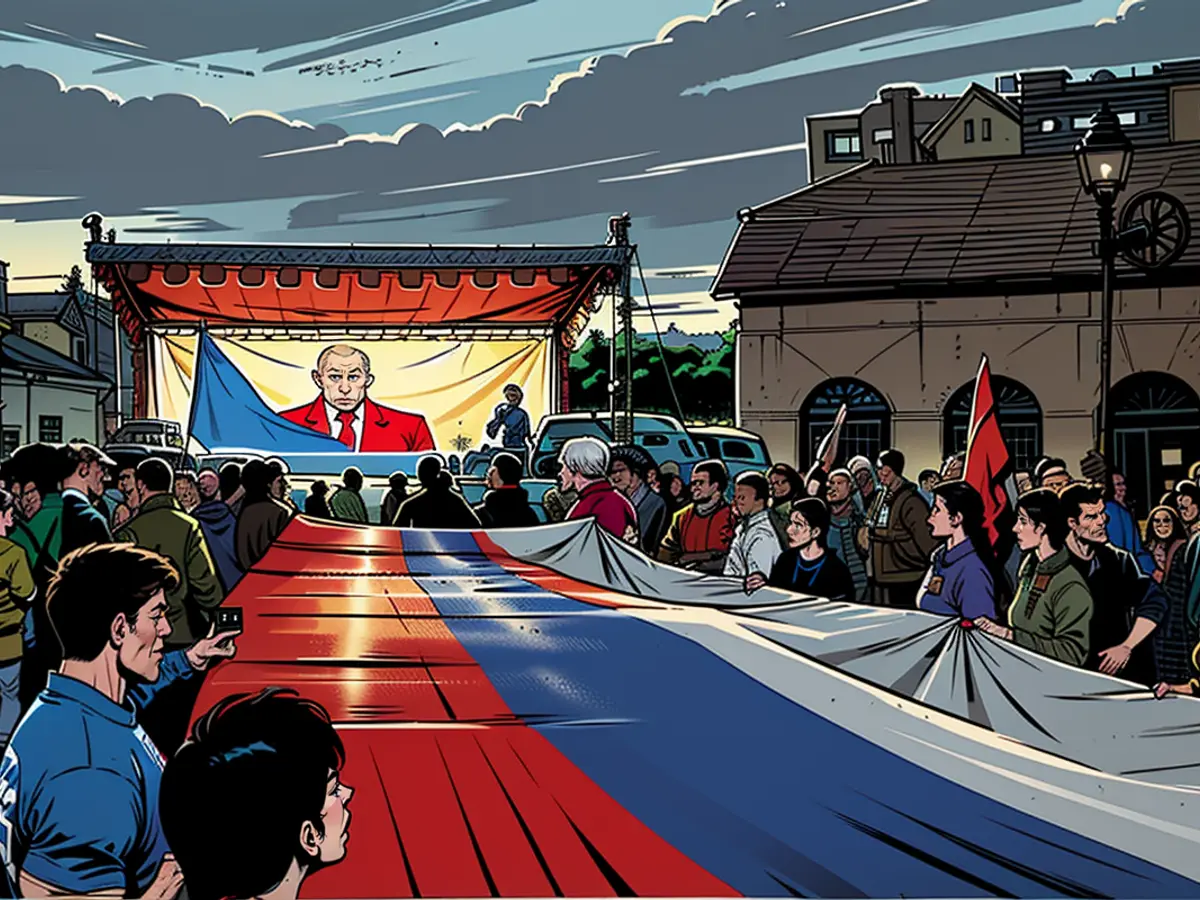Uncertainty shown by Putin amidst turbulence
Ukrainian Military Making Strides in Kursk Region, Leaving Putin Appearing Indifferent and Unsure. Russia's Image of Power Takes a Hit. Russia's Elite Contemplates Putin's Usefulness.
Approximately a year ago, President Vladimir Putin graced a gathering in the Kursk region to celebrate the 80th anniversary of the Soviet Army's triumph in the Battle of Kursk during World War II. A captivated audience, including veterans returning from combat in Ukraine, revered Putin for praising the Battle of Kursk as a "heroic feat" of the nation's people. Now, as Russia commemorates the 81st anniversary of the battle coming up this week, Kursk gets another mention - this time, for radically different reasons.
On August 6, Ukraine's troops launched an unexpected offensive in the region, resulting in the capture of numerous villages, hundreds of prisoners, and the evacuation of towns housing thousands of civilians. Russia was taken aback by this offensive, and conscripting reservists is reportedly being utilized to counter some of Ukraine's hardiest units in the battlefield.
Putin has minimized the Ukrainian advance, as seen in a televised conference with his security council at Kursk on August 12. During this encounter, Putin appeared uneasy, interrupting the current regional governor as he discussed the villages seized by the Ukrainians. Both the president and his advisers refrained from calling a spade a spade, referring to the offensive as "Kursk-region incidents", a "situation", or "provocation."
State media followed suit, showing chaotic scenes of evacuated villagers receiving aid and donating blood, portraying the events in Kursk as a catastrophe, not the largest assault against Russia since World War II.
Putin's Image Fades
During his 24 years in office, Putin has been projecting himself as the sole figure capable of safeguarding Russia's security and stability. Yet, the war's commencement two and a half years back has dented this image even as support for him remains high. Russian cities have endured strikes by Ukrainian drones and artillery, and last year saw the later-mysteriously-killed Wagner mercenary leader Yevgeny Prigozhin initiating a revolt against his commanders. This terrorist attack in March led to 145 dead at a Moscow concert hall.
Although state television entertains support for Putin, pinpointing his allies' genuine sentiments is challenging. Putin is reliant on their silent endorsement, according to Ekaterina Schulmann, a political scientist and an external expert at the Carnegie Russia Eurasia Center in Berlin. What consistently lingers in their thought process, she says, is the question of "whether the current situation favors them or not."
Since the war began, life for these elites - Putin's inner circle, high-ranking bureaucrats, security and military officials, and leading businesspeople - has grown more troublesome, not better. Despite the war's enrichment of many of them, Western sanctions have limited their spending opportunities. The question the elites are now pondering about Putin, according to Schulmann, is whether he is still an asset or a liability.
One may say that Russia's elites are experiencing "dissatisfied compliance", asserts Nigel Gould-Davies of the International Institute for Strategic Studies in London. They are unhappy with the current status quo but will not risk supporting an alternative due to concerns about the outcome of a power struggle. They may also hope, Gould-Davies suggests, that Putin's reaction to the events in Kursk will follow the pattern of his previous actions, including being initially passive before eventually taking action.
Putin's Holiday During the "Kursk" Incident
This inclination can be traced back to his first days in power, beginning with the Kursk incident in 2000, during which a nuclear submarine fatefully collided with another ship in the Barents Sea, causing a torpedo explosion and ultimately the tragic loss of all 118 crew members. Putin initially decided to remain on vacation, which elicited harsh criticism, and waited five days before accepting international aid, potentially saving some survivors if he had acted sooner.
Putin also demonstrated hesitance in tackling the Prigozhin rebellion in June 2023, which briefly threatened his position as the country's undisputed leader. After the uprising failed, Prigozhin initially evaded captivity, but Putin ultimately triumphed, and Prigozhin met an untimely demise in a mysterious airplane crash.
As the Kursk offensive enters its third week, Putin persists in his schedule, even embarking on a two-day trip to Azerbaijan. He briefly alluded to the crisis on Tuesday, promising to "thwart those responsible for the crimes in Kursk."
Given the suppression of dissenting voices at home and loyal media, Putin can afford to adopt a cynical approach of dismissing the events in Kursk, according to Schulmann. However, the longer the Ukrainian offensive persists, the more significant the military and political challenges it poses.
Russia faces issues in deploying required forces to repel the attack, and as the offensive progresses, Gould-Davies explains, a significant inquiry arises as to what happens "when Russia’s elites decide that the conflict is unwinnable or (!) that it will never end as long as Putin remains in power."
The European Union, observing the escalating situation in the Kursk region, has expressed concern over Russia's actions and called for a peaceful resolution to the conflict. The European Union's foreign policy chief has stated that the Ukrainian offensive should not be used as a pretext for further aggression by Russia.
In light of Russia's struggles in the Kursk region and the international criticism it has faced, some analysts have questioned whether the European Union could seize this opportunity to strengthen its influence in the region and potentially challenge Russia's position in Eastern Europe.








